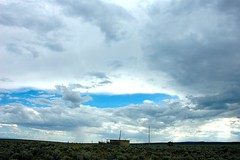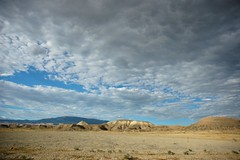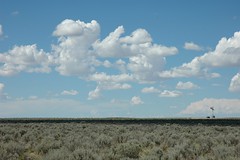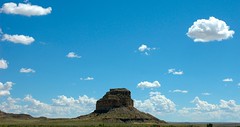
Saw the Coen Brothers’ No Country for Old Men. Need to see it again, because on the first pass I only half understood it. But I’m pretty sure it’s brilliant.
I know for certain it’s haunting, and I suspect that was by design.
(If you haven’t seen the movie and plan to, you may want to skip this post, because I’m going to spill all kinds of information as I try to make sense out of it. But please come back after you’ve seen it and tell me how you parsed it, because this is the kind of movie you want to spend long hours dissecting with friends before you dive in to see again. And again.)
Anton Chigurh, the psychopath with the pneumatic cattle gun played by Javier Bardem who drives so much of the action in the film, has a curious trait that I wouldn’t have thought to name if Mr. Hoo hadn’t raised the question on the way home, namely: “Why did he kill off the two corporate guys early in the film? I didn’t get that.” The two corporate fellows who, it appears, brought in Chigurh to track down poor old Llewelyn Moss, Josh Brolin’s character, the welder who, while hunting, stumbles by chance upon a drug deal gone bad, and traces, through careful inference, two million dollars -- under a tree, on a far ridge -- that was no longer needed by the dead man holding it.

Yeah. Doesn’t immediately make sense. But as the movie unfolds it appears there’s an logic baked in: Chigurh obliterates anyone who sees him in his official capacity. The corporate guys were dispatched to get him started on the trail, therefore... Too simplistic a syllogism maybe, but hear me out. Tommy Lee Jone’s character, Bell, who holds down the moral center of the film, refers to him as a “ghost”, and we hear passing reference to his immateriality as the story spools out.
“You saw him and you’re still alive?” Woody Harrelson’s Carson Wells asks Llewelyn. And while Llewelyn claims so, it’s not entirely true: he heard Chigurh’s approach, saw the shadows of his feet under the door, his ghostly reflection in the glass. Never do they face each other square on the way gunslingers oughta. Not even at the end do we see the moment of their confrontation: we only see the remains. (Although Wells himself reports having seen Chigurh the previous November, by the movie’s end Wells too is dead.)
“Are you going to kill me?” asks the Accountant, after Chigurh has obliterated the corporate guy who was the boss of the other corporate guys, and Chigurh asks him, while full on facing him: “I don’t know: did you see me?”

And finally: “You didn’t see me,” states Chigurh, as he pays off the boys on bikes who assist him after he’s been sideswiped in a violent car accident at the movie’s end. These are his last words in the film, and it’s a bit startling to see that he leaves the boys standing -- he is, after all, fleeing the scene of a murder, where he obliterated a poor woman who did nothing more than wind up on the wrong side of a deal that Chigurh offered to her husband (a deal to which the husband never nearly agreed), and then fulfilled on “principle”. We learn about his principles earlier in the film -- and one’s left to wonder if we’re to assume that Chigurh is supposed to be the film’s moral center -- in an upended wild west kind of way.
Because this is a Western, after all, and even though it’s set in 1980 and drug runners have replaced cattle rustlers, the men pack shotguns, ride horseback (when they’re not driving Fords), and the overriding impulse of the film is to reign in lawlessness that has overrun its rim.
Which is why I keep coming back to this image of the shadowy Chigurh. The hero who impacts his environment profoundly and then disappears into the horizon at film’s end to destinations unknown is a prevailing theme in Westerns. Alan Ladd in Shane. Lee Van Cleef in For a Few Dollars More. Even Cleavon Little in Blazing Saddles. (Okay, okay: Cleavon Little and Gene Wilder. But buddies are allowed. And besides: Blazing Saddles was a parody in which they ride off on their horses before they pile into a waiting limousine. Fact that they parodied the ride to the horizon only strengthens my point. ;)
Our last shot of Chigurh in No Country for Old Men is from the back as he limps off into the horizon. Only in this film he’s surrounded by a Texas suburb rather than the wide open plain.

So what? Why does it matter? Is it a statement on the American West or the Hollywood Western that Chigurh uses a huge shotgun[1] outfitted with a silencer to enforce his disappearing act? Or is it just a really cool character device -- this violent impulse to be seen and yet remain unseen -- that Cormac McCarthy worked into the story for entirely different reasons?
The romantic notion of the tortured individual who’s seeking his soul's respite out on the broad Western horizon doesn’t hold up here. Maybe because the horizon’s run out -- there is no untamed West left -- and instead of wandering off into the far reaches where there is no one and none can find him and he can pursue his friendless solitary way -- in order to have the thing that Western heros seek, he must raze the horizon of all living things.
Maybe.
Or maybe it’s a statement on the American West: The human cost of that horizon; a horizon that, as wilderness evaporates under the forward movement of development, is increasingly illusory.
Hell I don’t know. Like I said: I only half understood it. Just haunted by a few of the possibilities. Haunted too by the theme of chance that circles strongly through the film.
But I need another viewing before I throw any more dust into this wind.
p.s. On a lark: it'll be interesting to see, given the film's dark & fleshy poster (among other things), whether the film's box office performance conforms to the law of dark movie posters »

[1] yeah. not a boy. can’t tell you what gauge the shotgun was. sorry.






7 comments:
oh sure, tell me not to read further and then post all those amazing sky photos and tempt me not to revisit them.
Try this, don't think of a white horse.
hahaha! too late isn't it?
but thanks for the warning I did look away and am now off to your flickr stream
Well, I read a very convincing unfavorable review of the novel, saying that it dealt in moral simplicities, attempting to create moral certainties - some men are inherently decent, some inherently bad. Which would be fine, the critic argued, but the novel did not create any moral lessons from this simplifation, thus wasting it.
Is there anything to that reading or was the guy talking out of something or other?
that's an interesting idea -- I didn't see that coming through in the movie, but I didn't read the novel so I can't attest to whether or not McCarthy was putting it out there.
there's definitely a strong anti-hero convention coming through in the film -- in many ways Chigurh functions as the lawman who's pursuing the fellow who stole the cash -- but the viewer's sympathies (mine at least) reside with the thief.
the *actual* lawman -- Tommy Lee Jones' character -- is almost wholly ineffectual -- always a beat behind, more tortured passive observer than actor, mopping up after the mess has been made. I think he's meant to be our moral observer -- but dang it, I *really* need to see it again to better understand what's going on.
there is this strange element of chance that runs through the movie -- Chigurh uses a coin toss periodically to determine his victim's fate (but only periodically -- most of the time he legislates without it) and the entirety of the film's core action is triggered by a chance event at the outset -- and then further complicated by a second chance encounter. but willful action is a component in these chance events -- chance operates a timing mechanism, perhaps, but not as an arbiter.
so, short answer: I saw more moral ambiguity and uncertainty than certainty. hope you'll see it -- would really like to hear your take on it.
Well, I found the article now. The guy - an acquaintance of mine from Bergen - argues that the sheriff becomes the voice of morality in the novel. He argues that he can be described as a conservative, decent guy. However, sheriff Bell keeps talking about how there's A New Kind of People gaining power, and the novel seems to imply that there is something eschatological about this. Ruthless, inhuman people. The 19-year old kid who had wanted to kill someone and didn't regret it (I think this is in the movie as well) exemplifies this, and then when Chigurh comes on the scene, the novel seems to make sheriff Bell right. Some people simply are not human anymore. Chigurh seems to have no human motivation.
Obviously, I disagree that such people even exist, and I think the descriptions of Chigurh and the 19-yold are exactly the kinds of descriptions that make moral ambiguity and political solutions of moral problems difficult. For instance: why do people deal drugs? Because they are somehow metaphysically evil, sick and inhuman or merely amoral (an individual actor-explanation) or because they are normal people responding to economic and social structures which reward and encourage their behaviour (a structural explanation)? The answer seems irrelevant to a lot of people, but the response to the individual explanation is to boost the prison-industrial complex and to give greater freedoms to the police. The response to the structural explanation is difficult, but better, involving better education, prophylactic program activities, poverty alleviation, foreign aid to coca-producing countries, international cooperation on crime syndicate response, etc. In short: reduce demands and try to ruin the market for drugs by making other choices of occupation more profitable. (Though it should be said that this doesn't mean drug kingpins aren't morally - and legally - culpable for their choices.) The difference between the one kind of explanation and the other really are quite something.
The guy further argues that the novel seems to deal in the language of moral parable, with Chigurh as a sort of demonic archetype, but that this parable doesn't lead into anything except feeding the conservative language of personal responsibility and good vs. evil.
I forgot: the old men of the title, he argues, is the old world order of standdards and decency, represented by sheriff Bell. If that's true, then it reallly is a profoundly conservative novel. I can understand why the Coens were drawn to it, though. They always did have a penchant for (biblical) allegory and parable.
compelling take. definitely agree that the sheriff is a conservative character -- but don't think the coin toss lands in his favor, in terms of any kind of overriding messaging. (that's my read on the movie -- may play out very differently in the novel.)
that is, I don't think the film advocates for a more conservative world. the sheriff may lament it, but in the end he's pragmatic, not nostalgic.
(important to mention that conservatism as stance in the American West makes perfect organic sense in this context -- those old school guys are everywhere in the West -- my grandfather was one. an old school conservative who didn't even nearly resemble anything like what you would call Conservatism -- or Republicanism -- today.)
more than anything I think the sheriff is trying to find his place within the changing world. and I'm not entirely sure that he succeeds -- instead he retires, as if he's bowing out and giving up.
I would argue that there's no certainty *anywhere* in this film -- it's highly ambiguous. unsettled and uncertain.
yeah: gonna think on this awhile. and see it again. and maybe mouth off some more.
and go see it! I want to hear your take on the film. :)
Yeah, I know. I miss the old Republican Party. I like conservatives, when they actually are conservatives. I disagree with them, but like arguing about them. I miss the republican party of Abraham Lincoln, y'know.
Anyway, I agree with the bowing out/retirement interpretation. I read a quote somewhere that he has a dream, at the end, where his father rides ahead of him to make camp in the dark woods. Obviously an impending-death metaphor, but also something about making one's way through a world that's going dark.
We get movies six months to a year after the US, I'm afraid. So it'll be a while.
Post a Comment